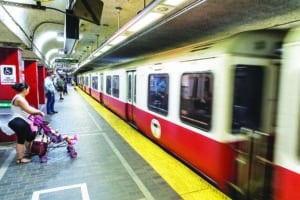Six potential MBTA dispatchers are in the hiring pipeline after more than 100 applied for operations center roles critical to subway service. But one T overseer is concerned it could take until 2023 to bring as many workers on board as officials need to bring subways back to normal frequencies.
MBTA General Manager Steve Poftak said Tuesday that the agency received 107 applicants during its hiring blitz for dispatcher positions in the control center, 26 of whom had sufficient heavy rail operator experience to meet the minimum requirements.
Six hires are in the process of joining or undergoing an extensive training regimen, according to Poftak and operations control center deputy general manager Aisheea Isidor. The training lasts at least 10 weeks and can accommodate six candidates at a time.
“These are people who are in training. Some folks do not make it through the training. Some folks make a choice in the midst of the training that this is not a job they want to do, so I want to be very careful we’re not counting these chickens before they’re hatched,” Poftak said. “I worry that people sort of treat this as an algebraic equation. These are human beings being trained to do a very demanding position.”
Federal investigators in June warned that a shorthanded workforce at the center created significant safety risks, with dispatchers sometimes required to work 20 hours followed by only four hours off. After being ordered to assign more feasible hours, MBTA officials slashed service on the Red, Orange and Blue Lines to reflect fewer available dispatchers. Business leaders have expressed serious concerns the T’s safety problems and the drop in train frequency were putting the vitality of downtown Boston at risk, with Greater Boston Chamber of Commerce CEO Jim Rooney saying in June that the T was “failing” employers.
Isidor said the MBTA wants to bulk up its operations control center staffing to 32 people, calling that the size needed “in order to run with the limitation of work hours.”
MBTA board member Travis McCready replied that it could take months to hit that goal.
“I know it’s not an algebraic equation, but still, I’m going to do the math,” he said. “A pipeline of six, rolling admins, 10 week minimum training time – that puts us well into 2023 to get to our intended number.”
When asked how much train frequency could be added on the Red, Orange and Blue lines as new dispatchers were trained, MBTA spokesperson Joe Pesaturo said in an email that, “While the OCC’s precise staffing needs are finalized, the MBTA is working hard to fill existing vacancies. The MBTA will revisit the reduced heavy rail schedule after it has adequate staffing to safely operate more service.”
“The MBTA is using a modeling exercise to help determine the number of dispatchers necessary to give supervisors the flexibility to maintain service while operating under the new work hour rules, the fatigue management program, vacations, etc.,” he added.
Banker & Tradesman staff writer James Sanna contributed to this story.







